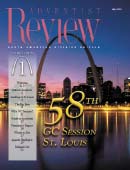 |
||
"I'm a faithful listener to the Voice of Hope. Every night, about 50 people in my village get together to listen to your radio program. Because we live in the remote mountainous area and are isolated from the outside, we have very few resources to advance our Bible knowledge. Your radio programs provide an in-depth explanation of the Word. The question marks in our minds are erased one by one. We see the mighty power of God through you." Despite the variety of communication methods available throughout the world today, there are still places that are almost impossible for the Adventist Church to reach--places where missionaries may not enter and pastors are unable to establish churches. AWR has served as the mission radio arm of the church since its first broadcast in 1971. Since then, the ministry has grown to more than 60 languages, which reach 70 percent of the world through shortwave radio, AM and FM stations, and satellite. In addition, programs available on the Internet are able to be heard anywhere in the world. A Unique Ministry
2. Partnership with other church organizations--AWR exists to serve the various organizations of the church in their soul-winning outreach. AWR makes it possible for church entities to enter new areas and reach wider audiences. Listeners respond to the local studios, which are linked to Bible schools. Where possible, local churches follow up with visitation. 3. Use of shortwave radio--Shortwave is the most widely heard broadcast vehicle in the world. Unlike AM or FM radio waves, the signals can travel for thousands of miles, enabling AWR to reach into countries that are closed to religious broadcasts in local media. More than 2.5 billion people tune in to shortwave radio on a regular basis. 4. Priority on the 10/40 window--Of the 6.2 billion people in the world, 4.2 billion live in the 10/40 window. This area is also the place where there are the fewest Christians, and it is our greatest mission challenge today. AWR places a priority on broadcasting to people groups that are difficult to reach in other ways. 5. Programming for a non-Christian audience--For many listeners, an AWR program is the first time they have heard about God's love. Producers use many approaches to create programs that meet listeners' needs, from health discussions and family life features to Bible studies and locally recorded music. This listener in the Middle East wrote: "I am a 15-year-old girl. I bought a Bible, and I started to browse through it to understand Christianity. When I discovered your station, I felt very happy because it answered most of my questions and has become a guide for me. I hope that you will continue guiding us." Growth and Change  AWR operations in the Americas region were reorganized in 2004 and merged with the Adventist Media Center in Brazil. AWR's highly popular live call-in program Open Clinic was moved from Costa Rica to an AWR studio in Puerto Rico. AWR operations in the Americas region were reorganized in 2004 and merged with the Adventist Media Center in Brazil. AWR's highly popular live call-in program Open Clinic was moved from Costa Rica to an AWR studio in Puerto Rico.
Plans for Progress One of AWR's goals during the next five years is to increase the attractiveness and effectiveness of the programs made for special groups. This is called contextualization, and AWR plans to help producers prepare programs that are appropriate for Muslims, Hindus, Buddhists, animists, atheists/secularists, and those who hold other widespread ideologies. AWR also wants to encourage greater integration of its radio ministry with other ministries of the church. This involves adequate follow-up of listeners, more resources in local languages, and better coordination with Global Mission Pioneers and other workers. The age of missions is not past, and the work that AWR does is still essential. For more information, please contact: Adventist World Radio |
 |
 |



 1. Programs created by local people--The majority of programs that AWR broadcasts are produced in studios operated by union conferences. The producers are native speakers of the local languages, who understand their target audiences and cultural idioms.
1. Programs created by local people--The majority of programs that AWR broadcasts are produced in studios operated by union conferences. The producers are native speakers of the local languages, who understand their target audiences and cultural idioms.